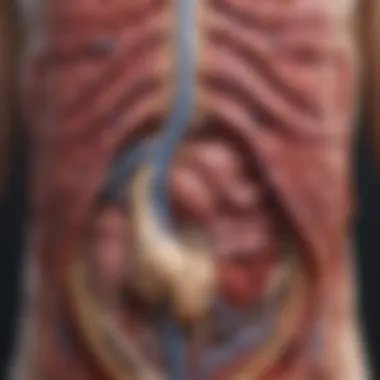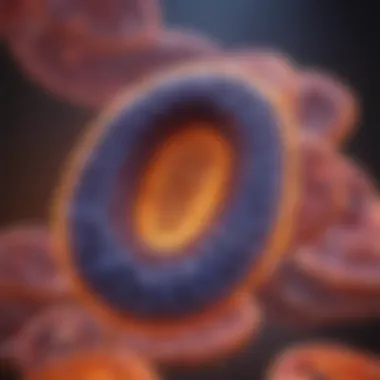Curing Pancreatitis: A Comprehensive Guide


Overview of Research Topic
Brief Background and Context
Pancreatitis is a condition characterized by inflammation of the pancreas, a crucial organ involved in digestion and blood sugar regulation. This inflammation can be acute or chronic, each type presenting unique challenges and treatment paradigms. Acute pancreatitis may arise suddenly and can be due to factors such as gallstones, chronic and excessive alcohol consumption, or certain medications. Chronic pancreatitis develops over time, often stemming from repeated bouts of acute pancreatitis or ongoing alcohol use. Research indicates its connection not just to digestive health but also to systemic health complications, highlighting its role in wider metabolic and immune processes.
Importance in Current Scientific Landscape
Understanding and potentially curing pancreatitis holds significant implications as it affects thousands globally each year. The complexities of the pancreas and the variations of pancreatitis type demand a multifaceted approach in treatment. With the advent of technological advancements in medical research, investigateing these conditions has become increasingly intricate. The integration of novel therapies and lifestyle modifications, emphasizing mitochondrial health and dietary approaches, is essential for improving patient outcomes.
Methodology
Research Design and Approach
This article adopts a comprehensive review methodology, synthesizing current literature, expert opinions, and clinical guidelines on pancreatic health and pancreatitis management. The aim is to deliver an encompassing view of the various treatment avenues that could lead to curing the condition, focusing on innovative therapies and traditional treatments.
Data Collection Techniques
Data for this guide is gathered from:
- Peer-reviewed journals examining pancreatitis
- Clinical trials that showcase effective treatment pathways
- Reliable health websites such as Britannica and Wikipedia
- Insights from discussions on forums including Reddit
- Current treatment protocols from reputable hospitals and healthcare institutions
The result is a narrative that equips readers with knowledge about the latest advancements in the field and practical recommendations tailored for patients and healthcare providers.
Understanding Pancreatitis
Pancreatitis is a critical health issue that demands attention. Understanding this condition is fundamental for both patients and healthcare providers. An informed perspective on pancreatitis can facilitate early diagnosis and effective treatment. This illness involves inflammation of the pancreas, which plays a vital role in digestion and blood sugar regulation. Thus, recognizing its nature can significantly impact patients' quality of life and overall health outcomes.
Definition of Pancreatitis
Pancreatitis is defined as the inflammation of the pancreas. This condition may arise suddenly or develop gradually over time. The pancreas is responsible for producing enzymes that help in digestion and hormones that manage blood sugar levels. When it becomes inflamed, these functions can be compromised, leading to various health complications.
Types of Pancreatitis
Acute Pancreatitis
Acute pancreatitis is characterized by the sudden onset of inflammation, often resulting from gallstones, chronic alcohol consumption, or certain medications. One key aspect is that it can be a life-threatening condition requiring immediate medical intervention. Acute pancreatitis is a significant part of understanding pancreatitis due to its potential for rapid progression and the urgency for treatment. If not managed promptly, complications can include infection, organ failure, or necrosis of pancreatic tissue.
Chronic Pancreatitis
Chronic pancreatitis involves ongoing inflammation that alters the structure and function of the pancreas. This condition usually results from prolonged alcohol abuse or genetic factors. Its battle with inflammation may lead to permanent damage. Recognizing chronic pancreatitis is essential since it can sneak up on individuals, leading to a multitude of digestive issues and diabetes. Its persistence makes management more complex than acute cases.
Symptoms and Diagnosis
Common Symptoms
Common symptoms of pancreatitis typically include severe abdominal pain, nausea, vomiting, and fever. Identifying these symptoms can lead to timely medical intervention, which is critical in managing the condition effectively. The distinctive nature of abdominal pain in pancreatitis often sets it apart from other gastrointestinal disorders, making it crucial for practitioners to recognize.
Diagnostic Tests
Diagnostic tests play a vital role in confirming pancreatitis. They include blood tests, imaging studies like abdominal ultrasound, and sometimes CT scans or MRI. These tests help determine inflammation's severity and possible underlying causes. Understanding the diagnostic process aids healthcare professionals in creating effective treatment plans. Proper diagnosis is invaluable, as it informs subsequent medical decisions and patient management strategies.
Causes of Pancreatitis
Understanding the causes of pancreatitis is crucial for both prevention and treatment. Recognizing the underlying factors can help patients and healthcare professionals develop effective strategies to address this condition. By exploring these causes, the article sheds light on the multifaceted nature of pancreatitis and its management.
Biliary Tract Disease


Biliary tract disease encompasses a range of conditions that affect the bile ducts, gallbladder, and the liver. One common issue is gallstones, which can obstruct the bile duct, leading to inflammation of the pancreas. When bile is unable to flow freely, it can back up into the pancreas, triggering an inflammatory response. Therefore, managing gallstones and other biliary conditions is essential to prevent acute pancreatitis. In many cases, surgical intervention may be required to remove obstructions.
Chronic Alcohol Use
Chronic alcohol use is a significant risk factor for the development of pancreatitis. Excessive alcohol consumption can cause inflammation and damage to pancreatic cells. This inflammation can lead to both acute and chronic forms of pancreatitis. The mechanisms behind this are linked to alcohol's impact on digestive enzymes and the pancreas's ability to process substances. For individuals struggling with alcohol dependency, addressing this behavior is crucial for recovery and long-term management of pancreatic health.
Genetic Factors
Genetic predisposition plays a role in the development of pancreatitis. Certain inherited conditions, such as hereditary pancreatitis, increase susceptibility to this inflammation. Variants in specific genes may disrupt the normal function of the pancreas, leading to episodes of pancreatitis. Understanding these genetic factors can assist healthcare providers in identifying at-risk individuals, ultimately guiding personalized prevention strategies and treatments.
Metabolic Disorders
Several metabolic disorders are linked to pancreatitis. For example, conditions like hyperlipidemia, characterized by high levels of lipids in the blood, can precipitate episodes of acute pancreatitis. Other metabolic factors can impact bile composition and pancreatic function, contributing to inflammation. Recognizing these conditions underlines the importance of metabolic health in pancreatitis management. Patients may benefit from regular screenings for these disorders, allowing for timely intervention and support.
Medical Treatments
Medical treatments for pancreatitis are crucial in managing this complex condition. They aim not only to relieve symptoms but also to address underlying issues related to pancreatic function. Effective treatments can significantly improve the quality of life for patients. Alongside lifestyle changes and dietary modifications, medical interventions play a substantial role in controlling inflammation and preventing recurrences.
Medications
Pain Management
Pain management is a fundamental aspect of treating pancreatitis. Patients often experience severe pain during flare-ups. The use of nonsteroidal anti-inflammatory drugs (NSAIDs) and opioids may be necessary to alleviate discomfort.
The key characteristic of pain management is its focus on reducing suffering. By specifically targeting pain pathways, it provides immediate relief. This is a popular approach as it allows patients to regain function and engage in daily activities more comfortably.
However, the reliance on opioids presents challenges, including the risk of dependency. Hence, careful monitoring and judicious use are necessary to mitigate such risks while managing pain effectively.
Enzyme Replacement Therapy
Enzyme replacement therapy (ERT) is vital for patients who suffer from pancreatic exocrine insufficiency. This therapy involves supplementing digestive enzymes to aid in the proper digestion of food.
The key characteristic of ERT is its ability to enhance nutrient absorption. For those with compromised pancreatic function, it is essential to prevent malnutrition and maintain overall health. It is a beneficial choice because it allows patients to digest fats, proteins, and carbohydrates more efficiently.
However, patients may need to adjust dosages, as individual responses can vary. Additionally, it may involve integrating specific dietary practices to optimize the effectiveness of the therapy.
Surgical Options
Pancreatic Drainage
Pancreatic drainage is employed when there are complications such as pancreatic necrosis or pseudocysts. This surgical procedure aims to remove accumulated fluids from the pancreas, reducing pressure and inflammation.
The key characteristic of pancreatic drainage is its ability to provide immediate symptomatic relief. It is beneficial as it helps in preventing further complications and improving healing within the pancreas.
The unique feature of this procedure is the minimally invasive techniques currently available, such as endoscopic drainage, which can lower the associated risks and recovery time for patients. However, it may not address underlying causes of pancreatitis, making follow-up care and continued management crucial.
Resection of Pancreatic Tissue
Resection of pancreatic tissue is indicated in severe cases or when there are tumors affecting pancreatic health. This surgical approach involves removing the affected portions of the pancreas to alleviate symptoms and improve function.
The key characteristic of this procedure is its potential to eliminate sources of chronic inflammation. It is a popular choice in cases where other treatment options have failed, allowing for a potentially greater chance of recovery.
However, removing too much pancreatic tissue can lead to complications, including diabetes and further endocrine dysfunction. Therefore, careful assessment is essential before proceeding with this type of surgery.
Impact of Endoscopic Procedures
Endoscopic procedures have revolutionized the treatment of pancreatitis. These methods allow for minimally invasive interventions to address issues such as bile duct obstructions and pancreatic duct strictures. Endoscopic retrograde cholangiopancreatography (ERCP) is a notable example.
The impact of these procedures is significant, with reduced recovery time and lower complication rates compared to traditional surgeries.
By enabling direct access to the pancreatic duct, they facilitate targeted treatments that can alleviate symptoms effectively. However, they require skilled practitioners, and not all patients may be suitable candidates for such procedures.
"Advancements in endoscopic techniques significantly enhance patient outcomes and reduce hospital stays."
Dietary Modifications
Dietary modifications play a crucial role in the management of pancreatitis. The pancreas is responsible for producing essential enzymes that help in digestion. When inflamed, as in pancreatitis, the organ's ability to function optimally is impaired. Thus, making informed dietary choices becomes vital for recovery and long-term health. Patients need to balance their intake of nutrients while minimizing substances that may exacerbate their condition. Understanding these aspects can lead to more effective management strategies.
Importance of Diet in Management
Diet is not just a matter of preference; it directly influences the health of the pancreas. An appropriate diet can reduce inflammation, support recovery, and prevent future attacks. It can also alleviate symptoms associated with pancreatitis, such as pain and digestive issues. Furthermore, a thoughtful dietary approach provides a foundation for overall well-being, enabling the body to heal and function optimally.
Recommended Dietary Changes
Making specific dietary alterations can significantly enhance the management of pancreatitis. The two most notable dietary adjustments include the adoption of a low-fat diet and ensuring adequate protein intake.
Low-Fat Diet


A low-fat diet is a key recommendation for those suffering from pancreatitis. The primary focus of this diet is to reduce fat consumption, which lessens the workload on the inflamed pancreas. By minimizing dietary fats, patients experience fewer symptoms and a decrease in potential complications. One unique feature of a low-fat diet is its emphasis on lean proteins and carbohydrates while actively avoiding high-fat foods, including fried foods, fatty meats, and full-fat dairy products. The advantages include improved digestive comfort and a lower chance of triggering pancreatitis symptoms. However, it may be challenging for some individuals to adhere to this diet long-term, requiring careful planning and monitoring.
Adequate Protein Intake
Ensuring adequate protein intake is also essential for individuals managing pancreatitis. Proteins are fundamental for the body's healing processes and muscle repair. A plan that incorporates lean protein sources, such as chicken, fish, and low-fat dairy, is often beneficial. The focus should be on including easily digestible proteins, which do not overload the digestive system. A key characteristic of adequate protein intake is its role in maintaining muscle mass, something that can deteriorate during inflammation or chronic illness. The unique advantage here is that it supports recovery while addressing the nutritional requirements of those with fluctuating appetites. Overall, combining adequate protein intake with a low-fat diet creates a balanced approach that nurtures recovery.
Hydration and Its Role
Hydration plays a significant role in the management of pancreatitis. Maintaining proper fluid intake helps in digestion and promotes kidney function. Dehydration can lead to further complications, so it's important for individuals to drink sufficient water throughout the day. Adequate hydration supports enzyme function and helps flush out toxins that may aggravate inflammation.
In summary, dietary modifications represent a cornerstone in the management of pancreatitis. By adopting a low-fat diet while ensuring adequate protein intake, patients can create an environment conducive to recovery and overall health. Additionally, staying hydrated complements these efforts and is vital for optimal organ function.
Lifestyle Changes
Lifestyle changes play a crucial role in managing and potentially curing pancreatitis. The pancreas is sensitive to various external factors, and adopting a healthier lifestyle can significantly improve its function and reduce inflammation. These changes do not guarantee a cure, but they can help manage symptoms and prevent future attacks. Understanding these adjustments is essential for patients striving for optimal pancreatic health.
Avoiding Alcohol
Alcohol consumption is a major risk factor for both acute and chronic pancreatitis. For individuals diagnosed with this condition, abstaining from alcoholic beverages is not merely advisable; it is essential. Alcohol can trigger inflammation in pancreatic tissues, leading to an exacerbation of symptoms. Moreover, continuing to drink alcohol can contribute to long-term pancreatic damage, increasing the likelihood of complications like diabetes or pancreatic cancer.
Many studies emphasize that individuals who stop drinking can experience a reduction in symptoms and, in some cases, a reversal of pancreatic damage. It is important for patients to understand that this abstinence should be part of a comprehensive treatment plan that includes medical guidance.
Smoking Cessation
Smoking is another significant factor affecting pancreatic health. Tobacco smoke contains numerous harmful substances, which can worsen inflammation and interfeire with the repair processes of pancreatic cells. Patients with pancreatitis who smoke are at a higher risk of developing more severe complications.
Cessation of smoking can lead to considerable improvements in health outcomes for those with pancreatitis. Various resources and support systems are available for individuals wishing to quit. Engaging with cessation programs or using nicotine replacement therapies can aid in transitioning away from tobacco use effectively.
Regular Physical Activity
Regular physical activity is not only beneficial for overall health but is particularly important for patients with pancreatitis. Engaging in moderate exercise helps improve metabolic function and aids in weight management, which are critical for patients dealing with this condition.
Exercise also promotes circulation, which is vital for recovery, and can alleviate some symptoms associated with pancreatitis. For individuals who may not be able to engage in vigorous activities, activities like walking, yoga, or swimming can be excellent alternatives. A well-structured fitness plan, developed in consultation with healthcare providers, can support pancreatic health and enhance quality of life.
"Incorporating lifestyle changes such as avoiding alcohol, quitting smoking, and maintaining regular physical activity can significantly impact the management and prognosis of pancreatitis."
Monitoring and Follow-Up
Monitoring and follow-up after the treatment of pancreatitis is crucial for managing the condition effectively. Consistent monitoring helps healthcare professionals assess recovery and adjust treatment plans based on progress. It ensures that any potential complications are identified early. Key elements in this process include regular health check-ups and an understanding of recurrence risks.
Regular Health Check-Ups
Regular health check-ups are essential for individuals recovering from pancreatitis. These check-ups involve comprehensive assessments that may include blood tests, imaging studies, and physical examinations. The primary goal of these evaluations is to monitor pancreatic function and detect any early signs of complications, such as pancreatic necrosis or pseudocysts.
Patients should visit their healthcare provider at least once every few months during the first year after recovery. Following this period, check-ups can be less frequent, depending on the patient’s condition. Engaging with medical professionals about symptoms and concerns during these visits can lead to better management of the condition overall.
Understanding Recurrence Risks
Patients may face risks of recurrence after an initial episode of pancreatitis. These risks can vary widely based on underlying causes, such as alcohol use or other metabolic disorders. Understanding these risks is fundamental for patients to make informed decisions about lifestyle and dietary changes.
Several factors contribute to the likelihood of recurrence, including:
- Continued alcohol consumption: This is a significant risk factor for pancreatitis relapse.
- Obesity: Being overweight can also increase the chances of further complications.
- Uncontrolled diabetes: Poorly managed blood sugar levels may impact pancreatic health negatively.
- Genetic predispositions: Certain inherited conditions can elevate risks significantly.
Patients and healthcare providers should create personalized action plans that address these risk factors to minimize the chances of recurrence. Regular education about symptoms and proactive communication can empower patients during their recovery journey.
"Successful management of pancreatitis requires a partnership between patients and healthcare providers, focusing on consistent monitoring and open dialogue about health concerns."


Overall, monitoring and follow-up care play an integral role in managing pancreatitis effectively. Through regular evaluations and an awareness of recurrence risks, patients can navigate their path to better health with support and evidence-based strategies.
Integrative and Alternative Therapies
Integrative and alternative therapies are increasingly recognized for their potential in complementing conventional treatments for pancreatitis. They offer various approaches that can be tailored to individual needs. Patients suffering from this condition may find benefit in incorporating these therapies into their overall management strategy. Understanding these options is crucial for individuals seeking all avenues to enhance their well-being and potentially achieve better health outcomes.
Role of Herbal Remedies
Herbal remedies hold a significant place in integrative therapies for pancreatitis. Various herbs have been shown to have properties that may support liver health and help reduce inflammation in the pancreas. Some traditional herbal treatments include turmeric, ginger, and milk thistle.
- Turmeric contains curcumin, which has anti-inflammatory properties that can potentially help in managing pancreatic inflammation.
- Ginger is known for its ability to relieve nausea and may also improve digestion, which can be beneficial for pancreatitis patients.
- Milk thistle has silymarin, which is thought to protect liver cells and might improve overall digestive health.
It is essential to consult with a healthcare provider before starting any herbal treatment. Each individual’s condition is unique, and some herbs may interact with medications or may not be suitable for all patients.
Acupuncture and Its Benefits
Acupuncture is a traditional Chinese medicine technique gaining attention in the West for its potential benefits in various conditions, including chronic pain and inflammation. For patients with pancreatitis, acupuncture may offer several advantages:
- Pain Relief: Acupuncture can help reduce pain perception and improve overall comfort. This may be especially valuable during acute flare-ups of pancreatitis, when pain can be severe.
- Stress Reduction: Managing stress is vital for overall health. Acupuncture may assist in reducing stress levels, which can contribute to better outcomes in chronic illnesses.
- Improvement in Digestion: Some studies indicate that acupuncture may enhance digestive function, something crucial for those impacted by pancreatitis.
Incorporating acupuncture as part of a broader treatment plan may help address the multifaceted challenges posed by pancreatitis.
Overall, a holistic approach to treatment, which includes integrative and alternative therapies, can potentially provide a more comprehensive management strategy for patients. Always ensure ongoing communication with health professionals regarding the use of these therapies, to create an informed and tailored treatment plan.
Research and Future Directions
Research into pancreatitis holds significant promise for future treatment options. Understanding the complexities of this condition can lead to improved patient outcomes and innovative therapeutic strategies. Ongoing studies focus on various aspects, from molecular pathways to potential drug developments that can address inflammation or restore pancreatic function.
One key area of interest is the identification of emerging therapeutic approaches. Researchers are exploring novel medications that specifically target the underlying causes of pancreatitis rather than merely managing symptoms. These drugs seek to modulate the immune response or improve local pancreatic tissue health. Additionally, advancements in biological therapies, including monoclonal antibodies, offer hope for more precise interventions that may prevent or reverse pancreatic damage.
Emerging Therapeutic Approaches
Emerging therapeutic approaches represent a vital avenue in the fight against pancreatitis. Innovations in pharmacotherapy aim to provide better management tools for acute and chronic forms of the disease. Promising research includes development of drugs that can potentially inhibit specific pathways that lead to inflammation.
Furthermore, gene therapy is a compelling prospect. By correcting genetic mutations or altering gene expression associated with pancreatic diseases, scientists hope to achieve long-lasting therapeutic benefits. Additionally, stem cell therapy could play a role in regenerating damaged pancreatic tissues, aiding recovery and function.
"The future of pancreatitis treatment lies in understanding and leveraging the underlying biological processes that govern pancreatic health."
Role of Genetics in Treatment
The role of genetics in treatment offers a deeper insight into personalized medicine's potential for pancreatitis. Genetic predispositions can significantly inform treatment strategies, helping to tailor interventions that align with individual patient profiles. For example, genetic testing may reveal mutations that contribute to the risk of developing pancreatitis. This information can guide proactive measures and targeted therapies catered to the unique genetic background of each patient.
Moreover, understanding the genetic factors that influence response to treatment can refine therapeutic options. Variations in gene expression can dictate how well a patient responds to certain medications or lifestyle modifications. Incorporating genetic knowledge into clinical practice could lead to more effective management of pancreatitis and improved patient adherence to treatment plans.
Ending
In concluding this article, it is paramount to emphasize the multifaceted nature of pancreatitis and the critical role that knowledge plays in its management. Each section discussed adds layers of understanding regarding this complex condition. From exploring the underlying causes to detailing modern medical treatments and possible alternative therapies, the information cultivates a more comprehensive picture of pancreatitis.
Summarizing Key Insights
Throughout the guide, we examined several key areas:
- Understanding Pancreatitis: Recognizing its definitions, types, symptoms, and diagnostic tools enhances awareness.
- Causes: Knowing what leads to the disease, including biliary tract issues and alcohol use, underscores prevention strategies.
- Medical Treatments: Patients can appreciate varied treatment avenues, including medications and potential surgeries.
- Dietary Modifications: We highlight significant changes in diet, recommending low-fat approaches and adequate hydration for better management.
- Lifestyle Changes: Avoiding harmful substances and incorporating physical activity are vital for recovery and health maintenance.
- Integrative Therapies: Acknowledging herbal remedies and acupuncture as alternatives provides patients with more options.
- Research and Future Directions: Insight into emerging therapeutic approaches keeps readers informed of the evolving landscape of pancreatitis treatment.
This holistic viewpoint equips both patients and healthcare professionals with knowledge that can spur proactive health choices, ultimately improving patient outcomes.
Empowering Patients Through Knowledge
Information is a powerful tool. By sharing insights about pancreatitis, this article aims to empower individuals affected by the condition. With a grasp on basic concepts, symptoms, and treatment options, patients become better advocates for their health. They can engage in meaningful discussions with healthcare providers, leading to more tailored treatment plans.
Patients should feel encouraged to seek knowledge from reputable sources such as Wikipedia, Britannica, and community discussions on platforms like Reddit and Facebook.
In essence, an informed patient is an empowered patient. This approach not only enhances adherence to treatment regimens but also helps in understanding the importance of lifestyle adjustments. As such, knowledge serves as a catalyst for improved health outcomes in pancreatitis management.



